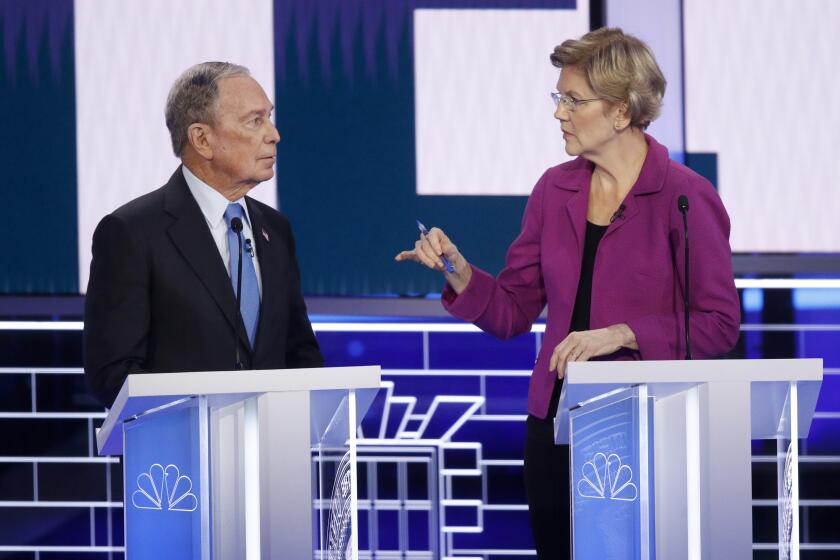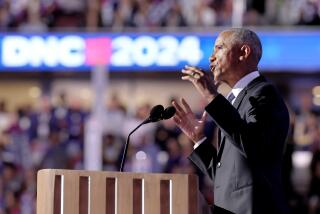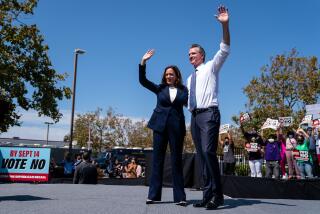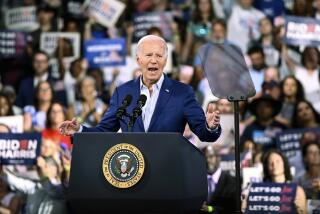5 takeaways from the Las Vegas Democratic debate
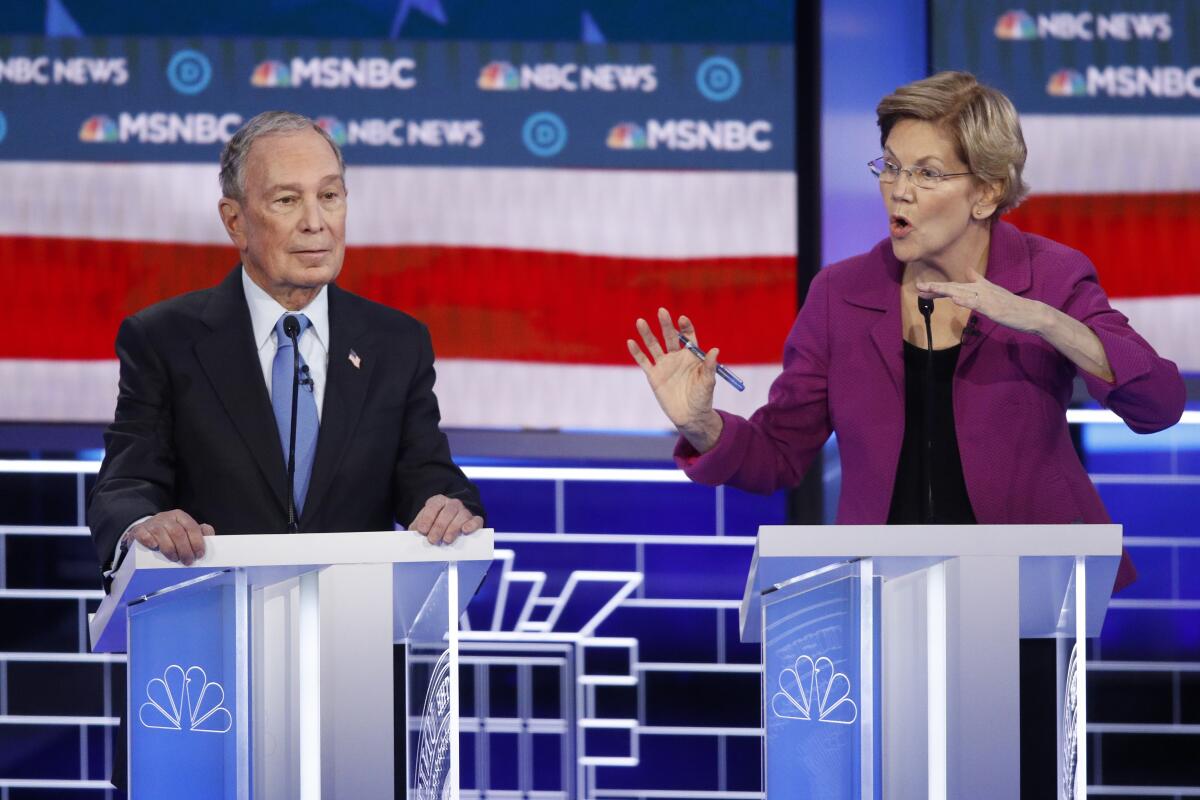
For five of the candidates on the debate stage it was like another night at the office. Michael R. Bloomberg made Wednesday’s ninth round different and more antagonistic than the rest.
The face-to-face encounter, broadcast live from the Paris casino-resort in Las Vegas, was in effect a national debut for the former New York City mayor, forced to step out from behind his teleprompter-aided speeches and unprecedented advertising onslaught.
As it happens, Bloomberg won’t be on the ballot in Nevada; he’s chosen to skip the early contests to focus on the voting that takes place in 14 states on March 3, billed as Super Tuesday. For others, the two hours in the TV floodlights offered the chance to revive flagging campaigns or turn in a momentum-building performance ahead of Saturday’s caucuses.
Here are five takeaways from Wednesday night’s fiery set-to on the Strip:
Bull’s-eye on Bloomberg
With a history of provocative remarks — on race, women, transgender people, millennials and much, much more — it seemed highly likely Bloomberg would be the focal point of the debate.
He was.
From the very first question, which led to an attack over New York City’s aggressive “stop-and-frisk” police tactics when he was mayor, to the night’s last televised gasp, Bloomberg was a frequent target.
His epic wealth, his party-switching political history and his insistence on nondisclosure agreements from some former employees were among the many lines of attack. Minnesota Sen. Amy Klobuchar even managed a backhanded jab as she expressed her pleasure at Bloomberg finally joining the candidates onstage, saying he “shouldn’t be hiding behind his TV ads.”
Former New York City Mayor Michael Bloomberg made his debut on a presidential debate stage -- and spent the night fending off bitter attacks from other Democrats as the race enters a critical phase.
Bloomberg made no apologies — for his riches, anyway. (He did express regret for the disproportionate impact the stop-and-frisk policy had on black and brown residents of New York.)
“I worked very hard for it,” he said of his many billions, adding he has given much of his money away — including, he added pointedly — a good deal to the Democratic Party and its candidates and causes.
Referring to his former neighbor from Manhattan, now a resident of the White House, Bloomberg offered a fight-fire-with-fire rationale for his free-spending candidacy.
“I’m a New Yorker,” he said. “I know how to take on an arrogant con man.”
Rust never sleeps
It’s been more than a decade since New York’s former mayor faced an opponent on the debate stage; the last time was in 2009, during his run for a third term in City Hall.
Facing a raft of far-more-practiced rivals, Bloomberg was stiff and often stone-faced, his immobility offering a striking contrast with the animated expressions of others.
But he turned in at least a serviceable — if somewhat irritable — performance, though surely Bloomberg made no friends among supporters of other candidates, especially one of his main foils, Bernie Sanders.
His voice thick with disdain, he referred to Vermont’s senator — who campaigns as a tribune of the working people — as “a millionaire with three houses.”
Only in America, Bloomberg said sarcastically.
Sanders’ elevated status
After a narrow win in New Hampshire and virtual tie for first in Iowa, Sanders has surged in polls and arguably emerged as the front-runner for the Democratic nomination.
That made him a target like never before.
He came under attack, once more, for his Medicare for All plan and vague explanation of how he would pass such an expansive piece of legislation — which has, at best, tepid support in Congress — and pay its gargantuan cost.
Democratic rivals suggest Sanders deserves blame for toxic and misogynistic online behavior by some supporters.
Rivals also went after Sanders over his refusal to release a fuller accounting of his medical condition; his spat with Nevada’s powerful Culinary Union, which opposes his healthcare proposal; the aggressive behavior of some online supporters; and his longtime status as an independent who formally joined the Democratic Party just last year for the sake of seeking its 2020 nomination.
“Let’s put forward someone who’s actually a Democrat,” former South Bend, Ind., Mayor Pete Buttigieg taunted, a slap that applied as well to Bloomberg, who has been both a Republican and an independent.
Sanders, unflustered, dished it back in return.
He suggested his record of labor support was second to none, defended his online army of supporters — blaming the toxicity on a tiny minority — and extended an invitation to any who doubted his recovery from a heart attack last fall.
“Follow me around the campaign trail, three, four, five events a day,” the 78-year-old said. “See how you’re doing compared to me.”
Hanging by fingernails
No two candidates have suffered more dramatic decline than former Vice President Joe Biden and Massachusetts Sen. Elizabeth Warren.
At different times each has been seen as the candidate to beat for the nomination. But after disappointing showings in Iowa and New Hampshire, both are struggling not just to stay in the top tier of contestants but, more gravely, to keep their candidacies afloat.
Warren, especially, fought as though her very life was at stake. (A bad cold clearly had taken its toll on her voice.)
Warren was relentless and scathing in her attacks on Bloomberg, whom she depicted as no better than President Trump. Why, she asked disparagingly, would Democrats want to “substitute one arrogant billionaire for another?”

She scoffed at his professed contrition over police tactics and offensive comments about women, suggesting it was, at best, politically motivated and insincere.
She depicted Klobuchar as too timid to take on the Washington establishment and even took a rare shot at Sanders, her ideological ally, for failing to rein in his more obstreperous backers.
“We are all responsible for our supporters and we need to step up,” she said. “That’s what leadership is all about.”
Biden was crisp and energetic, especially when he challenged Bloomberg over his stop-and-frisk policy, which the former vice president said, was halted only after the Obama administration intervened.
The question for both is whether their performances were too little too late.
Four’s a crowd
Several candidates are elbowing to emerge as the favorite of more centrist Democrats.
The result Wednesday night was a pile-up in the middle, involving not just Bloomberg and Biden but Buttigieg and Klobuchar, who went at each other particularly hard.
When Klobuchar was asked about her recent failure at a Las Vegas forum to remember the name of Mexico’s president, Andrés Manuel López Obrador, she described it is a momentary lapse.
Buttigieg suggested a larger failing, noting she is running for president based on her Washington experience but couldn’t — despite her role on committees overseeing border security and trade — answer such a simple question.
Klobuchar wheeled and cut him off. “Are you mocking me? she demanded. “Are you trying to say I’m dumb?”
It was one of several exchanges that went beyond political disagreements, seeming raw and deeply personal.
So much for “Midwestern nice.”

More to Read
Get the L.A. Times Politics newsletter
Deeply reported insights into legislation, politics and policy from Sacramento, Washington and beyond. In your inbox three times per week.
You may occasionally receive promotional content from the Los Angeles Times.

